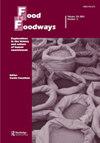“妈妈看,妈妈做”:对美国中西部低收入、高体重农村妇女代际“肥胖”传播的看法
IF 1.1
Q2 ANTHROPOLOGY
引用次数: 0
摘要
摘要公共卫生和媒体话语经常将孩子的体型归咎于母亲,包括应对多重结构性劣势的父母。美国中西部农村、低收入、自认为体重较高的女性(n = 25)参加了面对面的、录音的、半结构化的采访,了解他们对体型如何代代相传的看法。我们使用因果关系编码分析访谈。面对社会经济和地理障碍的参与者不重视体型中的遗传和表观遗传因素。相反,参与者关注的是父母的角色塑造,提供“致肥胖”食物,以及未能制定保护行为,如提供非“致肥胖的”食物和限制儿童的屏幕时间。研究结果表明,对儿童“肥胖”的道德化是普遍存在的,这些破坏性的话语已经被那些面临社会经济劣势的人所接受。本文章由计算机程序翻译,如有差异,请以英文原文为准。
“Mommy-see, mommy-do”: perceptions of intergenerational “obesity” transmission among lower-income, higher-weight, rural midwestern American women
Abstract Public health and media discourses frequently blame mothers for the size of their children, including parents coping with multiple structural disadvantages. Rural Midwestern American, low-income, self-identified higher-weight women (n = 25) participated in face-to-face, audio-recorded, semi-structured interviews about their beliefs regarding how body size is transmitted across generations. We analyzed interviews using causation coding. Participants facing socioeconomic and geographic barriers to salutogenic lifestyles de-emphasized genetic and epigenetic factors in body size. Instead, participants focused on parents’ role modeling, provision of “obesogenic” foods, and failure to enact protective behaviors like providing non-“obesogenic” foods and limiting children’s screen time. Findings demonstrate that the moralization of childhood “obesity” is pervasive, and these damaging discourses have been taken up among those facing socioeconomic disadvantage.
求助全文
通过发布文献求助,成功后即可免费获取论文全文。
去求助
来源期刊

Food and Foodways
ANTHROPOLOGY-
CiteScore
2.20
自引率
0.00%
发文量
16
期刊介绍:
Food and Foodways is a refereed, interdisciplinary, and international journal devoted to publishing original scholarly articles on the history and culture of human nourishment. By reflecting on the role food plays in human relations, this unique journal explores the powerful but often subtle ways in which food has shaped, and shapes, our lives socially, economically, politically, mentally, nutritionally, and morally. Because food is a pervasive social phenomenon, it cannot be approached by any one discipline. We encourage articles that engage dialogue, debate, and exchange across disciplines.
 求助内容:
求助内容: 应助结果提醒方式:
应助结果提醒方式:


